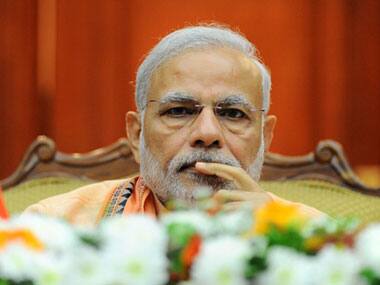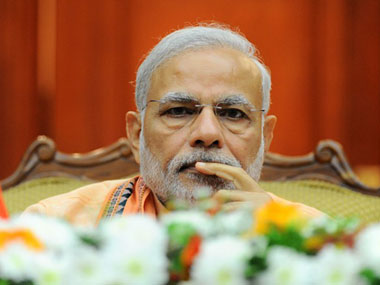Mumbai: Global rating agencies are evidently running out of patience with respect to the delay in the promised reform steps by the Modi government that should be acting as enablers for quick economic recovery. On Wednesday, in two separate reports, global rating agencies, Standard and Poor’s (S&P) and Fitch Ratings, warned that the only way the government under Prime Minister Narendra Modi can live up to its promise of bringing in achhe din to the economy is by showing the political will to push through key reforms. S&P has said that many corporations have halted their fresh investment plans until the government ‘puts the policy into action’.[caption id=“attachment_2170381” align=“alignleft” width=“380”]  Prime Minister Narendra Modi. AFP[/caption] “The key to corporate growth will be whether the government can deliver on its reform promises. If it does, we believe the top players will be ready to capitalise,” said S&P analyst Mehul Sukkawala in a note. “In the meantime, we believe the Indian corporate sector will maintain its conservative stance toward growth rather than throw caution to the wind.” Perception of global raters are critical for any aspiring economy since initial observations translate to warnings and warnings to rating actions eventually, if let unattended. Rating downgrades lead to high risk perceptions on Indian firms and, in turn, higher borrowing costs for them. To be sure, Modi government has surely attempted to kick of the reform process. The passage of insurance bill and several other small reform steps across sectors are indeed positive steps, but not adequate to excite global investors. What they look for is bold, convincing reform steps. This is the area, where Fitch has focused in Wednesday’s warning. “Fitch maintains that there continues to be a high degree of uncertainty over whether more substantive reforms will be passed,” Fitch said. One area, where the Modi government has clearly lost track is banking reforms. Modi and his finance team under Finance Minister Arun Jaitley have either underestimated or conveniently ignored the importance of critical reforms in banking sector such as paring government stake in micromanaged, capital-starved, corruption-prone state-run banks. So far, reforms in the banking sector have been limited to the announcement of creating a specialised Bank Boards Bureau (BBB), the promise to bring down stake in banks to 52 percent and setting up of a holding company to raise capital for banks. Beyond this, the NDA government has largely mimicked the UPA style in micromanaging banks—be it directed lending to specific sectors such as farming, pricing of loans and forced social sector spending. “High levels of government influence at public sector banks have been a key factor in directing lending for development and social objectives. Public banks account for the bulk of stressed assets, and are facing significant capital shortfalls over the next several years as a result,” the agency says. Presently, government owns more than 80 percent in three banks and above 75 percent in ten banks. Till last fiscal year, the government has spoon-feeding public sector banks with capital necessary to run their business operations and meet mandatory reserve requirements. But, beginning this year, the government has somewhat given up now saying it will give capital only to efficient, performing banks. Government plans to infuse just about Rs 8,000 crore in select large banks in fiscal year 2016, half of what they actually need, even as it has failed to infuse the promised Rs 11,200 crore last year. The government infused only Rs 6,000 crore in nine banks last year as against the promised infusion of Rs 11,200 crore. Clearly, there is no logic in government dumping these banks since these entities have been used as tools of incumbents to roll out populist measures such as loan waivers, for several years and fund the high-risk infrastructure and agriculture sectors, where private banks typically don’t lend. Interestingly, even when the government has let the state-run lenders fend for themselves, these entities continue to be used by the governments to implement directed lending. One example is agricultural lending. Banks are given an annual target by the finance minister in the budget every year to lend to a sector, whose contribution, as a percentage of GDP has fallen drastically over the years. In this year’s budget too, the government has set a target of Rs8.5 lakh crore for state-run banks. Going by the new target, farm loans currently constitute about 14 percent of the total bank loans and sizeable chunk to their bad loan pile. As a result of government influence in state-run banks, state-run banks currently account for over 90 percent of the total bad loans (Rs2.8 lakh crore) in the banking system and a similar proportion of restructured assets. AS Firstpost has noted before, the NDA government’s policies, as far as state-run banks are concerned, have been far off the track and has somewhat created a crisis situation in these entities, which would eventually force them to merge with other lenders. But even merging these entities can backfire As Reserve Bank of India (RBI) Governor, Raghuram Rajan, has warned creation of a large bank, merging two weak banks burdened with bad loans would create a bigger problem. Similarly, merging a weak bank with a well-run bank too can create a potential problem since the combined entity will have to deal with sticky assets of the acquired bank. Hence merging failed banks wouldn’t be a wise step. Creation of BBB is a positive step but not a sufficient reform step, Fitch notes. “This move, alongside various other smaller policy changes over the past year, have been limited in scope, lacking in detail and other significant governance reforms requiring legislation remain to be passed,” Fitch said. The only solution, if the government is serious about bringing in reforms in state-run banks, is to let go of the majority control in these entities and let private investments and expertise flow into these entities. The government can still ensure these banks continue to adhere to social sector objectives through banking sector regulations and keep their ownership diversified. Paring government stake below 51 percent in state-run banks was a recommendation of PJ Nayak committee on banking sector reforms, which submitted its report in May, 2014 and something Fitch, in its warning on Wednesday, has reiterated. “Ultimately, the RBI’s recommendations directly target the reduction of government influence in the management of public sector banks. That said, government is likely to continue to exert considerable influence on state-owned banks over the near term unless more substantive reforms are put in place,” Fitch has said. The message from the raters is clear: The world is losing patience with the NDA government with respect to the promises for big reforms in the economy, beyond the small, incremental steps. For all good reasons, the Modi government should show the political will to deal with critical banking sector reforms.
Perception of global raters are critical for any aspiring economy since initial observations translate to warnings and warnings to rating actions eventually, if let unattended.
Advertisement
End of Article


)
)
)
)
)
)
)
)
)



